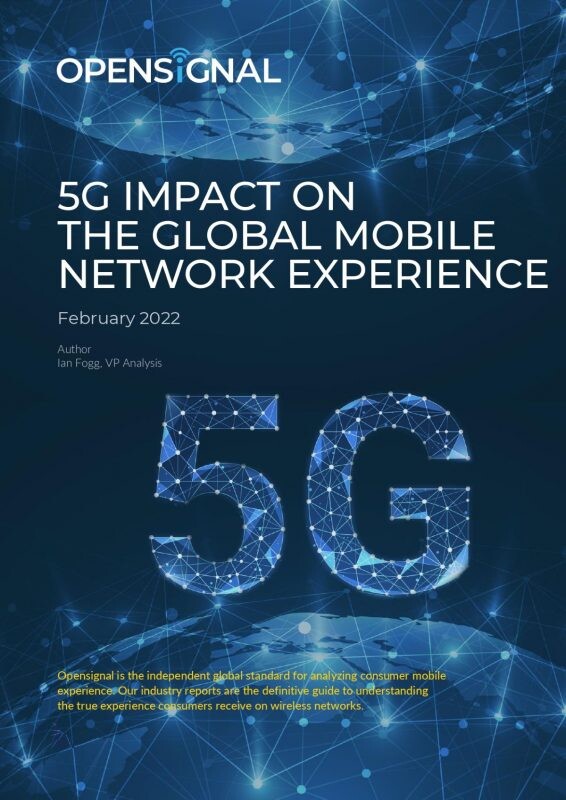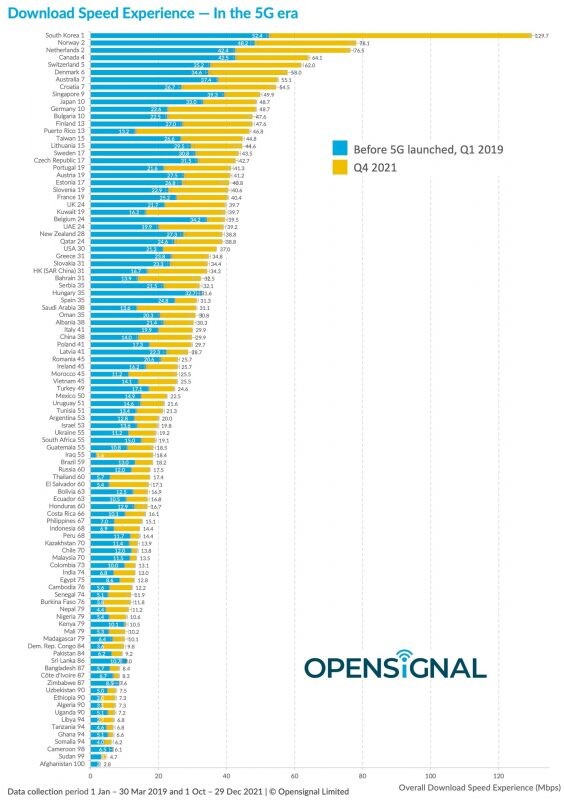Opensignal unveils "5G IMPACT ON THE GLOBAL MOBILE NETWORK EXPERIENCE" report
By Ian Fogg, VP Analyst at Opensignal

Opensignal unveils 5G IMPACT ON THE GLOBAL MOBILE NETWORK EXPERIENCE report on February 2022, which found that the average download speed of Opensignal's Thai users, 17.4 Mbps, was three times faster in Q4 2021 compared to before 5G's arrival in Q1 2019. Besides that, Thailand ranked joint 40th for Games Experience across 100 global markets in 4Q 2021, with a score of 64.2 points on a 100-point scale.
Key Findings
National average speeds have broken the 100 Mbps barrier for the first time
In South Korea average download speeds were 129.7 Mbps at the end of 2021, up from 52.4 Mbps at the start of 2019, before 5G. Similarly, our users' speeds more than doubled in Germany rising from 22.6 to 48.7 Mbps, in the Philippines (from 7 to 15.1 Mbps), Saudi Arabia (13.6 to 31.1 Mbps), and in Thailand (5.7 to 17.4 Mbps), was three times faster in Q4 2021 compared to before 5G's arrival in Q1 2019. — all of which are 5G markets.
Global rankings have changed because of 5G
South Korea now tops global Games Experience, up from 10th place at the start of 2020. Markets where 5G arrived later (e.g., Malaysia, New Zealand, Czech Republic) or where new wireless spectrum capacity for exclusive 5G usage is in short supply (e.g., Singapore) have fallen down the download speed rankings. While those with ample new 5G spectrum have risen, notably Finland, Saudi Arabia, Switzerland, the UK, and the UAE.
In the 5G era, overall average download speeds have increased almost everywhere
Across both 4G-only markets and in 5G markets, Download Speed Experience has risen in the last three years. In 95 of 100 global markets, smartphone users have seen their average download speed increase between the first quarter of 2019 — before 5G — and the last quarter of 2021.
All top 20 global markets for Games Experience in 2021 have launched 5G
In first place is South Korea with a score of 88.5 on a 100-point scale, followed by the Netherlands (85.5). Both markets rate as Excellent (85 or above). But there is less evidence that 5G explains these high rankings because comparing the percentage change we see for scores in 4G markets have jumped similarly to the Games Experience in 5G markets. (Thailand ranked joint 40th for Games Experience across 100 global markets in 4Q 2021, with a score of 64.2 points on a 100-point scale.)
In 98% of 5G markets speeds have risen at the slowest hour of the day
New 5G wireless spectrum and improved backhaul from cell sites has helped operators relieve congestion. At the slowest hour of the day, typically 8pm or 9pm at night, average download speeds have increased despite growth in mobile data usage.
The best 5G experiences are yet to come
Current 5G networks mostly use Release 15, but there are new standards coming. More wireless spectrum will arrive which should boost speeds considerably, even in markets that already offer 5G. Responsiveness will improve with updated 5G technology, e.g., Release 17. Networks will support many more devices simultaneously. Reliability should be boosted. Analyzing the real-world mobile experience, using a single methodology globally, enables everyone to see if the promises of 5G's designers are being fulfilled for users.
Why the best of 5G experiences is yet to come?
We have not yet seen the full impact of 5G technology on users' mobile network experience. For example, we expect speeds to rise considerably as more 5G spectrum becomes available for use, even in markets that already offer 5G. Responsiveness will improve with updated 5G technology. Networks will support many more devices simultaneously. Reliability should be boosted.
While the overall Games Experience now is little affected by 5G, monitoring mobile gaming now acts as a litmus test. Or, to mix a metaphor, it's a gaming canary which helps us to spot if the next stage of 5G experience is starting to happen. Why is 5G not completely here now? To date, almost all 5G services use early versions of the 5G standard — mostly Release 15.
Every few years the main industry standards body — the 3GPP — coordinates the creation of a new technology mark which vendors and mobile operators aim to use to improve users' experience.
There are already several versions of 5G either at various stages of development or which have been finalized and will soon see widespread commercial deployments.
Analyzing the real-world mobile experience, using a single methodology globally in all markets and on all networks, enables everyone to see if the promises of 5G's designers are being fulfilled for users. As 5G evolves, this continuous flow of analytics is critical because 5G technology and the mobile experience of users are forever changing (even when there is no pandemic).
The full analysis and insights can be found here: https://www.opensignal.com/reports/2022/02/5g-impact-on-global-mobile-network-experience
About Opensignal
Opensignal is a mobile analytics company. It's the independent global standard for understanding the true state of the world's mobile networks based on measurements of real user experience. Opensignal's industry reports are the definitive guide to the true experience consumers receive on wireless networks, and it independently measure this across every major network operator around the globe.

ติดต่อเราได้ที่ facebook.com/newswit